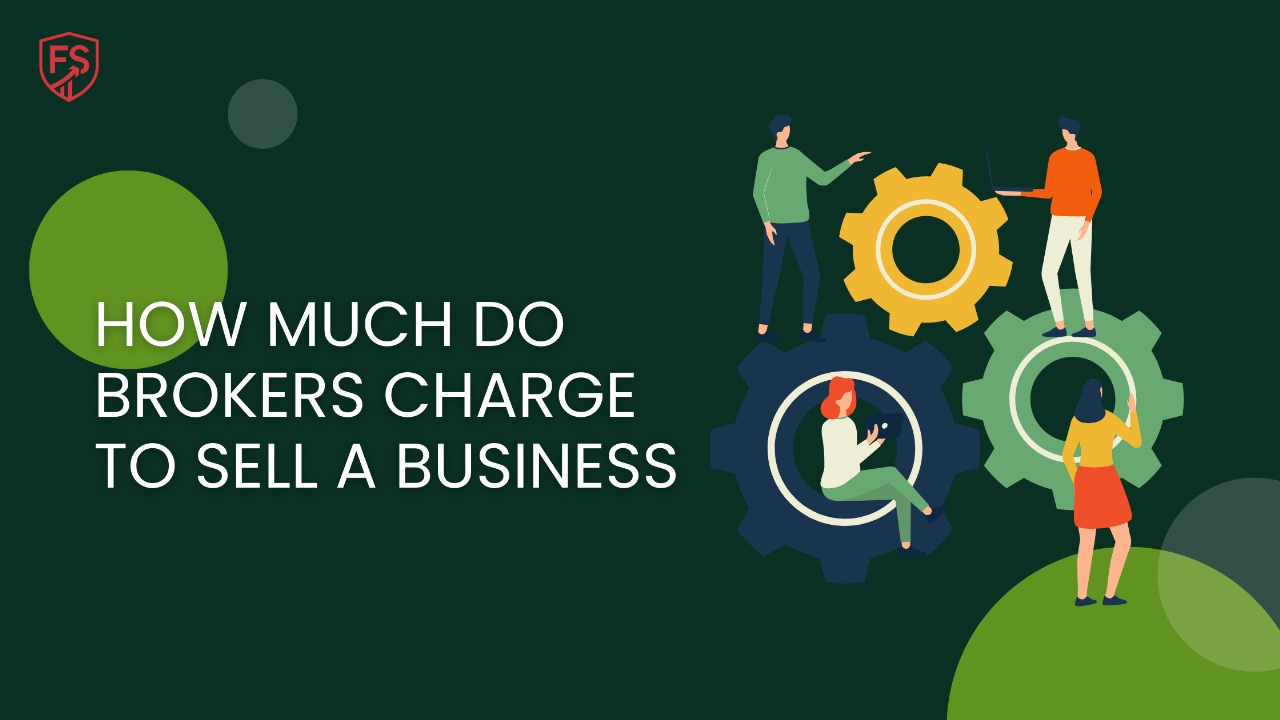If you’re planning to sell your business, one of the first questions that will pop into your mind is simple yet critical: How Much Do Brokers Charge to Sell a Business. I remember when I was first exploring the idea of selling my small business, I was shocked at the wide range of answers out there.
- The Quick Answer to How Much Do Brokers Charge to Sell a Business
- Understanding the Business Broker Fee Structure
- Why Do Brokers Charge These Fees?
- Are Business Broker Fees Worth It?
- Factors That Affect How Much Do Brokers Charge to Sell a Business
- Personal Anecdote: My Broker Fee Negotiation
- Comparing Broker Fees vs. DIY Selling
- Additional Considerations
- FAQs
- Conclusion
Some people said 8 percent, others claimed 12 percent, and then a few insisted on flat fees. The truth is, broker charges can feel confusing, especially if you’ve never gone through the process before.
That’s why in this guide, I’m going to break it all down in plain English. I’ll share real numbers, typical broker commission percentages, what affects the cost, and even sprinkle in some personal lessons I learned along the way.
Think of this article as sitting down with a friend who’s already been through it. By the time you finish reading, you’ll know not only How Much Do Brokers Charge to Sell a Business, but also whether those fees are worth it.
The Quick Answer to How Much Do Brokers Charge to Sell a Business
Let’s get right to the point. Most business brokers charge between 8% and 12% of the final selling price as a commission. That’s the average business sale commission rate you’ll find across the industry. Some will also set a minimum fee, often around $10,000 to $20,000, to make sure they’re compensated fairly even on smaller deals.
To put this in perspective, if you sell a company for $500,000 and the broker charges a 10% commission, the fee would be $50,000. Sounds like a lot, right? But keep in mind that a good broker may actually help you sell your business for a much higher price than you’d manage on your own, which can offset or even exceed their fee.
When I was considering hiring a broker, I actually pulled out a “How Much Do Brokers Charge to Sell a Business Calculator” that I found online. Plugging in my expected sale price gave me a real sense of what to budget for, and that transparency eased my mind.
Understanding the Business Broker Fee Structure
The truth is, there’s not just one way that brokers charge. The business broker fee structure can vary depending on the type of business, its size, and even the region you’re in. Let’s break down the most common ways fees are structured.
Commission Percentage
This is the most common model. Brokers take a percentage of the sale price, usually business broker commission rates of 8–12%. This percentage is sometimes negotiable, especially for larger deals.
Minimum Fees
For smaller businesses, brokers might insist on a minimum fee. So even if 10% of your sale equals only $7,000, they may set the floor at $15,000. That’s why small business broker fees can feel disproportionately high.
Retainer Fees or Upfront Costs
Some brokers require upfront payments, often called retainers. You might wonder: Do business brokers charge upfront fees? The answer is yes, sometimes. It’s less common for main street brokers but very common in mergers and acquisitions.
Success Fees
Many brokers work mostly on success fees. That means they only get paid if they successfully sell your company. This model aligns their interests with yours.
Why Do Brokers Charge These Fees?
I’ll be honest when I first saw that 10% figure, I nearly fell off my chair. But when I dug deeper, I realized why brokers charge so much. Think of it like hiring a real estate agent, but on steroids.
- They create confidential marketing packages.
- They screen and qualify buyers.
- They negotiate on your behalf.
- They handle complex paperwork and compliance.
- They maintain confidentiality throughout the process.
Essentially, they make a very stressful business sale transaction smoother and often more profitable.
Are Business Broker Fees Worth It?
This is the million dollar question, isn’t it? Or perhaps the $50,000 broker fee question. From my experience, yes, they can absolutely be worth it. Here’s why:
When I tried to gauge interest in my company on my own, I got low ball offers and time wasting buyers. Once I consulted with a professional, the offers became more serious, and the prices were far higher. Brokers know how to position a business, how to highlight strengths, and how to negotiate. The cost of using a broker to sell a company often pays for itself.
Factors That Affect How Much Do Brokers Charge to Sell a Business
Not every broker will quote the same fee. Here are some common factors that influence the cost:
- Size of the business: Bigger businesses may have lower percentages.
- Industry: Some industries require more specialized buyers, which impacts broker fees for selling business.
- Complexity: If the sale involves licenses, multiple locations, or heavy due diligence, expect higher costs.
- Location: A quick search for Business Brokers near me will show that rates can differ by region.
Personal Anecdote: My Broker Fee Negotiation
I remember sitting across from a broker in a coffee shop, nervously sipping my latte, as he explained his broker commission percentage. I felt my stomach drop when he said “10% with a $20,000 minimum.” I thought to myself, “That’s my kid’s college fund right there.”
Instead of panicking, I asked if there was room to adjust based on the final sale price. We agreed to a sliding scale: 10% on the first $500,000, and 8% beyond that. That negotiation saved me thousands and taught me an important lesson: business broker fee negotiation tips matter.
Comparing Broker Fees vs. DIY Selling
If you’re wondering whether to skip brokers entirely, you’re not alone. On forums like How much do brokers charge to sell a business Reddit, you’ll see heated debates. Some people swear brokers aren’t worth the cost, while others say they couldn’t have sold without one.
DIY selling saves the commission, but it also costs you time, stress, and potentially lost value. A broker might sell your business for 20–30% more than you’d get solo, which usually covers their fee.
Additional Considerations
- Who pays the business broker fee? Usually, the seller pays from the proceeds of the sale.
- Buy side business broker fees: Sometimes buyers hire brokers, especially in larger acquisitions.
- How much do business brokers make? With 8–12% commissions, successful brokers can earn significant incomes.
- How to become a business broker: If this world fascinates you, you might even explore this career path yourself.
FAQs
Q: What percentage do business brokers charge?
A: Most brokers charge 8–12% of the final sale price, sometimes with a minimum fee.
Q: How much does it cost to hire a business broker?
A: It can range from $10,000 to several hundred thousand, depending on your business size.
Q: Do business brokers charge upfront fees?
A: Some do, especially in larger M&A firms. Always ask before signing.
Q: When do you pay business broker fees?
A: Fees are usually paid at closing, directly from sale proceeds.
Q: Are business broker fees worth it?
A: In many cases, yes. Brokers can often secure higher prices and smoother sales.
Conclusion
So, How Much Do Brokers Charge to Sell a Business? On average, expect 8–12% of your final sale price, with minimums in place. It may feel steep, but when you consider the expertise, negotiation skills, and time savings, those fees often pay for themselves.
If you’re considering selling, use a calculator, talk to multiple brokers, and don’t be afraid to negotiate terms. Trust me, having the right broker in your corner can make the difference between a stressful process and a profitable, smooth transition.
Checkout our latest post: Trwho.com Security Complete Guide for Safe Browsing









